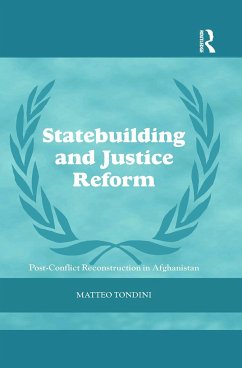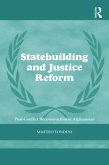The book provides an updated account of justice reform in Afghanistan, which started in the wake of the US-led military intervention of 2001. In particular, it focuses on the role of international actors and their interaction with local stakeholders, highlighting some provisional results, together with problems and dilemmas encountered in the reform activities. Since the mid-1990s, justice system reform has become increasingly important in state-building operations, particularly with regard to the international administrations of Bosnia, Kosovo, East Slavonia and East Timor. Statebuilding and Justice Reform examines in depth the reform of justice in Afghanistan, evaluating whether the success of reform may be linked to any specific feature or approach. In doing so, it stresses the need for development programmes in the field of justice to be implemented through a multilateral approach, involving domestic authorities and other relevant stakeholders. Success is therefore linked to limiting the political interests of donors; establishing functioning pooled financing mechanisms; restricting the use of bilateral projects; improving the efficacy of technical and financial aid; and concentrating the attention on the 'demand for justice' at local level rather than on the traditional supply of financial and technical assistance. This book will be of much interest to students of Afghanistan, intervention and statebuilding, peacekeeping, and post-conflict reconstruction, as well as International Relations in general. Matteo Tondini is a researcher and a legal advisor. He has served as a project advisor to the Embassy of Italy in Kabul, Development Cooperation Unit, working within the 'Afghanistan Justice Program' and has a Phd in Political Systems and Institutional Change, from the Institute of Advanced Studies, Lucca, Italy.
Hinweis: Dieser Artikel kann nur an eine deutsche Lieferadresse ausgeliefert werden.
Hinweis: Dieser Artikel kann nur an eine deutsche Lieferadresse ausgeliefert werden.








